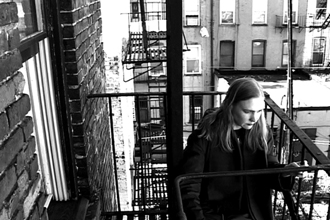Jennifer Reeves
USA 2003

|
" Arsenal 13.02. 17.30 |
Produktion: Peeping Jane Productions
Weltvertrieb: Jennifer Reeves, Peeping Jane
Prod., P.O. Box 633, New York, NY 10276
Tel.: (1-917) 749 63 90
E-mail: jennreeves@earthlink.net
Buch, Kamera: Jennifer Reeves
Schnitt, Ton: Jennifer Reeves
Musik: Elliott Sharp, Marc Ribot,
Zeena Parkins, Pitt Reeves
Darsteller: Lisa Jarnot, Susan Arthur,
Rainer Dragon, Jennifer Reeves
Format: 16mm (von DV-Cam und 16mm), s/w
Länge: 95 Minuten, 24 Bilder/Sek.
Sprache: Englisch
The Time We Killed is a black-and-white experimental feature that portrays the life and imaginings of a poet unable to leave her New York City apartment. Robyn Taylor tries to comprehend and fight her growing agoraphobia by looking into her own past and confronting the world events of the present (from terrorist attacks on the US to the war in Iraq). Robyn's obsessive ruminations threaten to drive her deeper into the solitude of an illusory world, until a personal encounter with death prompts her to leave the safety of home once again. Jennifer Reeves: ”Many films that deal with mental illness depict the afflicted characters as freakish and mysterious. I have sought to create a unique cinematic form that will bring the viewer closer to identifying with a person they might at first find illogical or disturbing. Documentary material, scripted and improvised scenes are interwoven to create a hybrid of true fiction in this subjective and poetic film. As Robyn gets lost in reveries of another time and place, an intricate film montage flashes before the eyes: abstracted impressions of once-loved people, places and animals. The talking cure of psychoanalysis is evoked as Robyn's history and unconscious struggles unfold in a freeassociative voice-over of her thoughts. Robyn's fixation with the past takes on new meaning when we learn about a fall from a bridge which left her with amnesia at the age of 17. Recollections of time spent in a mental institution indicate her compulsion to lock herself away from society. The Time We Killed uses stark high-contrast b&w 16mm scenes to represent the frail beauty and deteriorated memories of Robyn's inner world, and DV-Cam scenes depict her more confined present life.”
Jennifer Reeves, geb. 1971 in Colombo/Sri Lanka. Kindheit in Ohio und in Michigan. Kunststudium an der University of California. Filme seit 1990, u.a. Chronic (1996), We are Going Home (1998), Darling International (1999). The Time We Killed ist ihr erster abendfüllender Spielfilm.